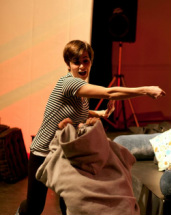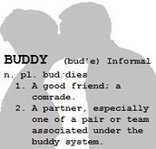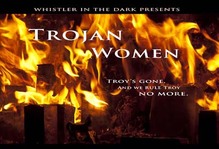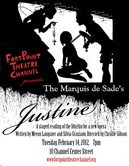 From BURNING UP THE DICTIONARY
From BURNING UP THE DICTIONARY
 From BURNING UP THE DICTIONARY From BURNING UP THE DICTIONARY Like any other design discipline, fight directing begins with the text. I'd like to take a moment to discuss approaching a text as a fight director and/or a movement specialist. While it's obvious that the play must be read before any other work is done, what one is looking for when they read and how one's findings are utilized hasn't had a whole lot of public discussion.
0 Comments
 As some of you know, I became an Artistic Associate of Whistler in the Dark Theatre in late 2011 after numerous collaborations. Part of what this means is that I have the ability to initiate projects through the organization. I'm currently curating two ongoing projects that are near and dear to my interests: the Playwright Incubator Program and the Schollah Holla Project. I'd like to take this opportunity to discuss the Schollah Holla Project, as it has already had public events, and as we have one more Holla coming up soon as part of our programming for our production of Vinegar Tom (January 27th for those of you intending to come).  The ICA in Boston, MA This past weekend I had the pleasure of performing in Experiment America 2012 at the ICA (Institute of Contemporary Art) in Boston. My director was Mikhael Tara Garver and the event was part of the Emerging America Festival. During this process I also had the opportunity to work closely with Will Pickens, the sound designer and voice director, who directed and recorded me in an A Brief Guide, an "audio tour" written by Jason Gray Platt, as well as with Jeff Stark, who guided me through the suitcase installations (more on those later on). Experiment America was a large immersive theatre experience utilizing the entire museum. It was a big project. Really big. The sort of thing that falls under Richard Schechner's concept of Performance of Magnitude; that is, a performance that is too large for any one spectator to experience the entirety of. Keeping that in mind, I cannot hope to describe the event as a whole. My own small part, however, was interesting and fun enough to give me plenty to write about.  Graphic by Alison McDonough Last month I had the pleasure of having a public staged reading of my new full-length play, Burning Up the Dictionary, performed with Vagabond Theatre Group. This took place at Trident Booksellers & Cafe as part of their "There Will Be Words" reading series. Before I say much more I do have to point out that I was very amused to have a play that's largely about language appear in a series called "There Will Be Words." Readings are a step in the development of a new play. I once discussed this process with a computer programmer friend and we realized that we had something significant in common: neither playwrights nor programers really know what they've done until they get to see it running. The staged reading is a sort of a test run of a play wherein the writer can figure out what changes they intend to make as the work evolves. This was the first time I've heard the play in its entirety in front of an audience. I did have the privilege of a table reading of an earlier full draft at the Lark Play Development Center this past November (which I blogged about here) and I got to hear a chunk of it at a Small Theatre Alliance reading back in September (which I also blogged about) after earlier development through Playwrights' Commons' Summer Playground. All three were really useful experiences, and the script has come a long way because of them, but this last piece was a larger step as it was an opportunity for me to evaluate the current (more advanced) draft under more public conditions and figure out what to do with it next.  This post is largely about backstory. I will try to avoid spoilers, but lately I am becoming of the belief that there are very few real spoilers out there for those that are aware of plot structure and the societal background of many of the stories we tell. I bring this up for two reasons. One: I recently saw The Avengers (which was awesome). And two: Whistler in the Dark is not only producing Trojan Women, but through them I have put together (and will be moderating) the pilot panel of a new initiative called Scholars' Echoes, in which advanced doctoral candidates and recent PhDs from New England universities will be sharing their expertise with our audiences. You may be wondering what these things have in common...  This coming Valentine's Day there will be a staged reading of the opera libretto that I co-wrote with Silvia Graziano based on the Marquis de Sade's novel, Justine (an alternate version was called The Misfortunes of Virtue). This reading will be directed by Christie Gibson and once again hosted by Fort Point Theatre Channel and the poster you're looking at was designed by Cara Grace. We recently realized it would be helpful to hear it out loud again. Plus, what can be more appropriate for Valentine's Day? This is one more step in a project that's been a long time in the making... A close friend who does a lot of work with students and recent college grads recently asked me to articulate my "Love or Money Policy."
It goes like this... "Professional Fight Director and Stage Combat Instructor" is apparently one of the best jobs one can possibly have when attending a cocktail party (though for the record, I would like to state that I always say "Playwright" first). A surprising amount of intelligent and educated people are unaware that the job actually exists. And once they do know, there is a lot of curiosity about how our work is done.
Recently I've been teaching a whole lot of Intro to Stage Combat workshops in various settings, and I have a few more coming up in the near future. I've been saying for quite some time that the basics of stage combat are essential skills for actors, as well as incredibly useful for other disciplines within theatre & film. I would also say that taking such a workshop could also be a really interesting adventure for those outside of professional entertainment. I've written a whole lot about this subject (a dissertation and several articles) and have been the subject some interviews and so on in this capacity as well, so some of what I'm saying here I've said before, but anything I'm repeating is worth writing about again. The first priority of a fight director is the safety of the performers. For a profession with such a badass reputation, the practitioners spend a whole lot of time and energy being concerned with the well-being of everyone involved. Stage combat has more in common with a combination of ballroom dance and stage magic that it does with any actual fighting discipline. Once an illusion is decided upon, it becomes a matter of figuring out how to best execute it within the skill level of the cast and in the time allotted. This can be as "simple" as someone being slapped and/or falling down, or as complex as a duel to the death with chainsaws. The illusion must also further the story being told and support character development. If the fight director has done their job well it should be nearly impossible to determine where the director's work ended and where the fight director's has begun. I'd like to take a moment to discuss why the the study of stage combat is important and why acquiring some familiarity with the skills involved in portraying violence in performance should be given some priority across the various disciplines. In the past few days I've had three major projects come to fruition: my round table of Burning Up the Dictionary at the Lark Play Development Center, my devised piece, Ghosts of Hamlet in Something Rotten: Hamlet Remixed at the Boston Center for the Arts, and my talk as an alumni speaker at TEX: Tufts Idea Exchange. In the middle of all of this, I did the fights for The Nutcracker at Stoneham Theatre and continued my work on The Miracle Worker at Salve Regina University.
TEX will most likely get its own blog post some time after the videos are posted online. So I'd like to discuss the new plays, Burning Up the Dictionary and Ghosts of Hamlet. One piece is a fairly straightforward full length play, the other is a short piece of devised experimental theatre. Let's start with the less conventional of the two: |
Taking Note & Taking Notes
Meron Langsner, PhD
Playwright, Theatre & Performance Scholar, Fight Director/Movement Specialist, Director, Educator Archives
June 2020
Categories
All
|
 RSS Feed
RSS Feed